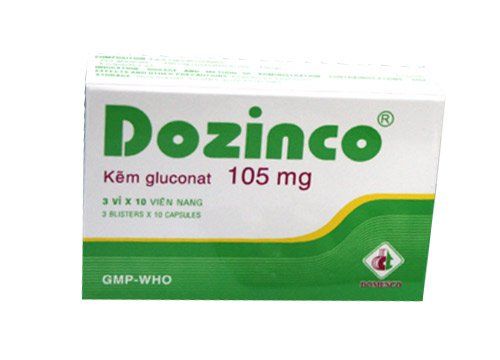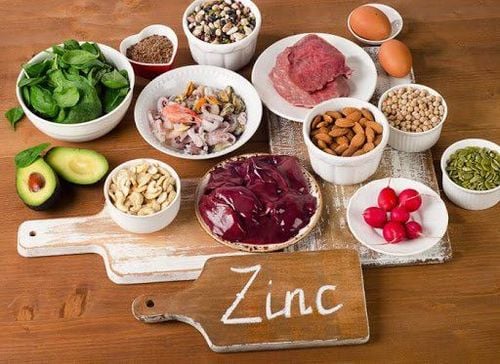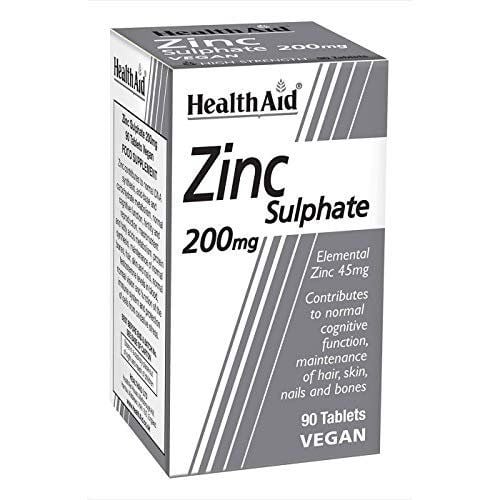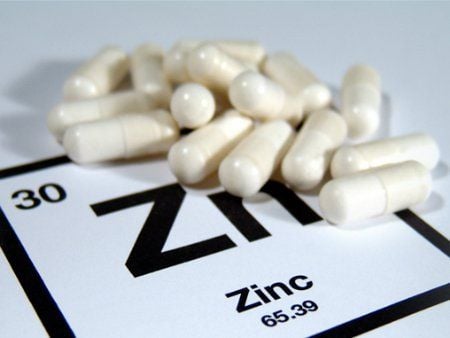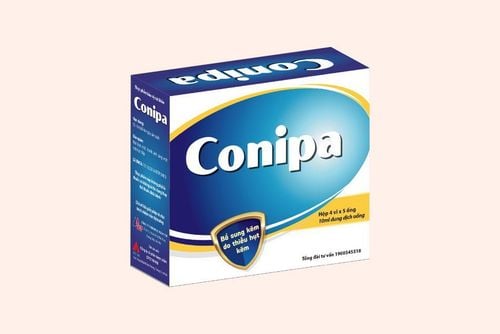This is an automatically translated article.
The article is professionally consulted by Resident Doctor, Master Dang Thi Ngoan - Pediatrician - Neonatologist - Department of Pediatrics - Neonatology - Vinmec Ha Long International General Hospital.Zinc is an essential micronutrient in the body. While whole foods are always the best way to provide this nutrient, a zinc supplement may be prescribed for young children if they are deficient or in need of treatment. In particular, the biological form of zinc for babies brings more benefits and is easier to absorb. Therefore, biological zinc supplements are today considered to be the best form of zinc for children.
1. What is Zinc?
Zinc is an essential mineral and trace element found mainly in cells and to a lesser extent in cellular fluids throughout the body. For example, the red and white blood cells in the circulatory system always contain a significant amount of zinc. Along with copper, zinc is an important component of the antioxidant enzyme superoxide dismutase.Zinc has many different functions in the human body and supports about 200 different enzymes, including enzymes needed for nutrient metabolism and enzymes important for translation and expression of genetic code. transmission.
An adult human body contains 2-4 g of zinc, which is distributed in all body cells, especially in muscles, bones and skin. However, these micronutrients do not have a definite stockpile and therefore they need to be in constant supply. The highest concentrations of zinc in the body are found in the prostate gland in men and in sperm cells.
The need for zinc is greatest in children, adolescents during puberty, in pregnant and lactating women, vegetarians, the elderly, heavy alcohol consumption, stress, diuretics and people sweat a lot.
Zinc is found in many foods, often higher in animal origin than in plants. Food sources of zinc include:
Oysters Cattle meat, poultry Nuts such as almonds, walnuts Pumpkin seeds Grains Spices Spinach Consuming zinc should be non-toxic if maintained within the dose range. recommended amount. However, excessively high doses of zinc (10 to 30 times the recommended dose) for longer periods of time can lead to copper deficiency. Besides, when taking iron and zinc at the same time can negatively affect the body's absorption of zinc. High levels of calcium in the blood can also reduce the absorption of zinc in the body.
2. What is bio-zinc?
On the market, zinc is used as a micronutrient, used to provide the body with 2 types of preparations: synthetic zinc and biological zinc. While synthetic zinc is produced industrially from chemical reactions in pharmaceutical factory labs, bioavailable zinc is derived entirely from nature.
Specifically, to produce biological zinc, scientists extract it from organic food sources, similar to how the body absorbs zinc from food. This helps to increase the absorption of zinc into the blood of biological zinc up to 3.7 times compared to synthetic zinc.
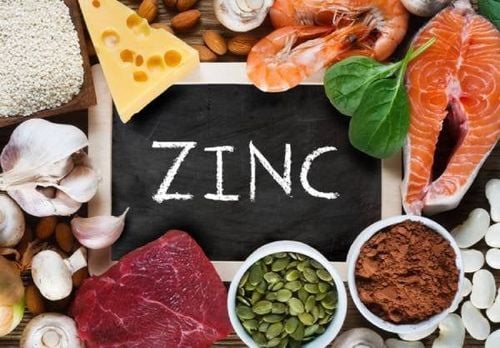
Kẽm sinh học có nguồn gốc từ tự nhiên
3. The advantages of bio-zinc
Brain development: As an essential mineral in the process of forming and developing the memory center of the brain, children need to be guaranteed an adequate supply of biological zinc from the fetal stage. In addition, for adults, zinc helps improve organ health, enhance ability, and recover from injury and disease.
Strengthens the Immune System: The immune response maintains its ability to function properly thanks to zinc. Therefore, zinc is necessary for the body's defense barrier against infectious agents, helping wounds heal faster. When the body is deficient in zinc, the functioning of most cells in the immune system, including T lymphocytes, B lymphocytes, and macrophages, becomes impaired. Children and adults often have recurrent respiratory infections or loose diarrhea.
Building the bone and joint system: Due to the advantage that the high absorption capacity of biological zinc is superior to that of synthetic zinc, this micromineral participates in the process of bone formation of osteoblasts, continuous repair as well as bone marrow suppression. activity of osteoclasts. Therefore, zinc supplementation increases the activity of growth hormone, helping children to develop outstanding height in children or adolescents at puberty.
Regulate digestive system function: Zinc plays an important role in maintaining the secretion of fluid on the digestive tract, thereby increasing the ability to digest food. When the body lacks zinc, children may have anorexia. On the other hand, blood zinc content is too low, affecting taste perception, making children eat less appetizing, thereby slowing growth, easily falling into malnutrition. In addition, zinc is also essential for the renewal of intestinal tissues and the production of bile to keep the intestines healthy.
Stabilize the nervous state: In the hypothalamus, which is responsible for memory and emotions, neurons contain high levels of zinc. If zinc levels drop, nerve activity is easily inhibited. This is the reason for abnormal behavior such as anger, irritability or extreme behavior. Statistically, patients with disorders such as autism, hyperactivity, depression, eating disorders, bipolar problems, schizophrenia and Alzheimer's often have zinc deficiency in their blood.
Enhance absorption and metabolism: The process of the body absorbing and metabolizing substances from food into the blood requires a series of reactions with the participation of hundreds of enzymes. Along with trace minerals such as copper, aluminum, manganese, magnesium, calcium, zinc also play an important part in the body's process of synthesizing the right enzymes to meet essential needs. Accordingly, the participation of biological zinc is more effective than synthetic inorganic zinc forms; Moreover, biological zinc also helps the body eliminate the toxicity of heavy metals when exposed, thereby limiting cytotoxicity.

Bổ sung kẽm sinh học hợp lý giúp trẻ đem lại nhiều lợi ích cho sức khỏe của trẻ
4. How to supplement biological zinc for babies
In young children, zinc is involved in almost every activity of the body. If zinc deficiency, children will have many serious health problems, such as stunting, malnutrition, growth retardation; anorexia, slow weight gain; Poor resistance, frequent illnesses, infections with viruses, bacteria, etc. Therefore, zinc supplements in general or biological zinc supplements for babies to increase absorption efficiency are always recommended by many pediatricians. , nutritionist and concerned parents.
Accordingly, the amount of zinc that needs to be provided to children should follow the recommended dosage. Specifically, in young children, children up to 3 years of age, the zinc requirement is 3 milligrams; 4 to 8 years old: 5 milligrams; 9 to 13 years old: 8 milligrams. Male and female adolescents 14 years of age and older have zinc requirements of 11 milligrams and 9 milligrams, respectively.
Supplemental zinc should be the top priority as the original form of bioavailable zinc comes from a varied nutritional profile. Only when the child has a medical condition, does not tolerate enough food according to the needs or the child is too picky, parents can consult a doctor about ready-made biological zinc supplements. This is the best form of zinc when it has been “chelated” into amino and organic acids to increase bioavailability, ensuring optimal absorption. Some formulations of bioavailable zinc for babies are:
Zinc gluconate, one of the most common over-the-counter supplements, is made by fermenting glucose. Zinc nitrate, a water-soluble form made by combining zinc with citric acid. Zinc acetate, is produced by combining zinc with acetic acid and is the best zinc supplement for treating the common cold. Zinc picolinate is a popular supplement in combination with picolinic acid and has been shown to be absorbed effectively in oral form to treat and prevent zinc deficiency. For maximum effectiveness, parents should supplement biological zinc for babies at least 1 hour before or 2 hours after meals. At the same time, during this meal, parents should avoid giving their children high-fiber foods at the same time because it can interfere with absorption. In addition, the use of products for the purpose of supplementing biological zinc for children needs to comply with the doctor's prescription or the dosage prescribed on the label. The abuse of biological zinc supplements can affect the health of young children, causing an excess of zinc, leading to nausea, vomiting, loss of appetite, abdominal pain, diarrhea or poisoning. zinc, inhibiting other metabolic reactions in the body.
In summary, zinc is an essential trace element; However, since the body cannot store excess zinc, this mineral must be consumed regularly from the diet. When a child is anorexic or has a medical condition that causes an increased need for zinc, bio-zinc for children can become a perfect alternative, helping to ensure the growth and fortification of a strong immune system for children. when properly followed.
To have more knowledge about taking care of children according to age, please visit the website (vinmec.com) regularly and make an appointment with the leading doctors, Pediatricians - Nutrition experts when you need advice.





